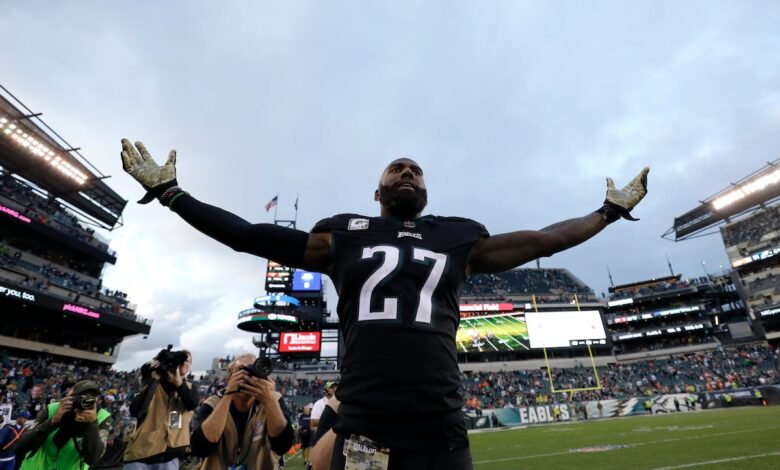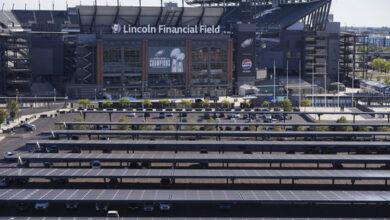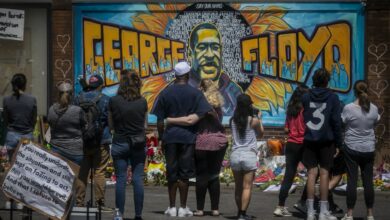Ex-Eagle Malcolm Jenkins wants to see financial literacy in Philly schools

On money
In Philadelphia, the football celebrity opened a brick and mortar retail storefront — Damari — which is also Jenkins’ middle name. It’s a variation of the name Amari which roughly translates to ‘eternal strength’, according to Jenkins.
The Old City shop sells custom suits — with a flair towards professional athletes who are often required to don formal attire for frequent events — among other fashion needs like celebrity red carpet festivities and weddings.
But that wasn’t his first business idea. Instead, Jenkins started a men’s accessory business known as Rock Avenue Bow Ties several years before.
“I was making handkerchiefs, bow ties, neckties, things like that when I was in New Orleans,” he said. “When I got here, I really expanded on that company and turned it into a full custom clothing line.”
During his professional athletic career, he noticed many athletes were relying on the same suit makers, and would show up wearing identical outfits to events.
“Every player shopped the same three custom clothiers. You come thinking you’re fresh and you’d see three guys with the same suit on,” he said. “The majority of guys, the reason they had on the same suits is because they would allow their reps to pick their clothes for them.”
But instead, Jenkins said he was already going through fabric swatches “picking out every button” and decided that all he needed was a manufacturer.
“I figured that if I was gonna be doing all the work anyway then I might as well make it myself,” he said.
Jenkins has found a mix of joy, and personal and financial satisfaction as an art collector too.
“Art has been one of the fun things that I’ve always been a part of [the scene],” he said, and even collected the art of a former NFL player Ernie Barnes.
But then, he started “getting serious” and spending time at art fairs getting to know the artists, and now has started studying the art market to invest in works that could appreciate in value.
“It’s a cool ecosystem and I relate to artists a lot because it’s a lot like athletes. They have a specific skill that not many in the world have at that level and there are a ton of people who love to watch it and engage with it,” he said. “So when you’re investing in them early they’ve got enough work where you know they’ve got momentum but they are at a price point that you can afford, and then you can just watch that grow just like an investment strategy.”
The overarching goal is for him to have a “highly regarded collection of contemporary Black artists.”
The retired football player’s vision for financial literacy in schools grew out of his own realization that to harness and grow his wealth from professional sports he had to pay attention. He once asked a financial planner to calculate how long $5 million dollars would last with the lifestyle he was sustaining — it was surprisingly short.
“If you have $5 million dollars in the bank, like you’re doing pretty good. But just for the exercise of it, I just wanted to know, if I didn’t get picked up and my career was over, how long would this money last. Because in my mind, I was like, I don’t ever have to work again,” he said. “That was usually the consensus, like if you make it to the league, you won’t have to work again. But that is not the case at all.”
Jenkins detailed why he strategically negotiated his own contracts instead of leaving everything up to an agent — in short — he wanted to get involved in his own destiny. Here’s what he learned about being a free agent.
“You won’t win a negotiation if you’re not willing to get up from the table,” he said. “If you’re not willing to leave, then you’ll take whatever they give you, respect yourself enough to understand how things move. Put your foot down where you need to and how to value yourself and bet on it. But it’s scary to bet on yourself.”
At first he said he didn’t realize he could even ask his financial advisor why all of his investments were only in stocks and bonds — no real estate.
“A financial advisor will tell you the only way you’ll make money is in a stock market,” he said, noting there’s a difference between being rich and wealthy. Often the wealthy invest in private equity deals and real estate.
Jenkins remembered his first business investment: an apartment complex in Ohio that was purchased with a line of credit for just shy of $1 million.
“I jumped in front of the line [of offers] because I was the only one who could pay in cash [from the bank as opposed to a mortgage],” he said. “The building was fully occupied so it immediately cash flowed and paid for itself. I remember asking my financial adviser — Is this legal? I just bought a million-dollar building and now I own it. I didn’t pay a single dime for it, that just seemed crazy to me.”
But investing in real estate is not intuitive for most, he said.
“A lot of people want to build our wealth off our labor, no matter if you’re making $5,000 or $5 million dollars,” he said. “But the minute you can’t work, you’re in an emergency. But when you talk about being wealthy it’s about your expenses being covered by the money that’s coming in that you don’t have to work for [because it’s investment income].”
That’s particularly difficult for athletes who are under immense pressure to perform and not take time for themselves.
“A lot of us want to focus so much, like all our time on our sport, but you realize that the sport — once they are done with you they will kick you to the curb and then you’ll start to try and build your own life,” he said. “And all of the support — people patting you on the back, everybody wants to help you, your social capital all of that — just steadily declines after you’re [done] playing.”
Because of his foresight — and a team of trusted business professionals — he was able to ‘walk away on my own accord’ and leave $6 million dollars on the table.
“I felt confident in my ability to survive and my own acumen, so that’s a blessing,” he said. “Most people don’t get to step away from the game. Their contract ends or the team tells you you’re not good enough anymore or you get injured.”
Family dynamics around money, especially for someone in the position where they are the first in their generation to accumulate significant wealth, can be a difficult juggling act.
“When you’re the first person to have success it’s a blessing. You get to hold that mantle for your family. You get to bring resources into your ecosystem. But you’re also now tasked with protecting those resources, oftentimes from your tribe because they don’t have the understanding of wherewithal about how to preserve it or grow it. It’s all about the needs and demands that are happening right now,” he said. “You give money to people thinking that’s the solution and you realize they aren’t educated enough or don’t have enough experience to handle that kind of money. It’s a really tough predicament for a lot of athletes and it is a cause of a lot of stress for guys who come from families who aren’t used to having this kind of money at their disposal.”
Jenkins’ business entrepreneurship portfolio includes Broad Street Ventures, a $10 million investment fund with Black and Brown investors, which includes some NFL players. The fund invests in ‘late stage and growth stage investments in consumer products and tech companies’. Also included are Damari, the Philadelphia ‘fashion house’, Disrupt Foods, a restaurant franchise network and investment company, E&R Real Estate, a developer with projects in Ohio, Pennsylvania, New Jersey and Georgia. He even runs a documentary company known as Listen Up Media.
But don’t expect more businesses in the funnel.
“I don’t want to start anything [else], I’m tired,” he said. “It’s more about investing. We’re looking for opportunities for companies that are growing. The cornerstone of our business is franchising.”
The Disrupt Foods enterprise is primarily Papa Johns and Wingstop locations, the goal is to become the largest Black-owned franchisee in the nation for the fast casual food brands.
“It makes no sense for every guy in the [NFL] league who wants to get into franchising to find an operator, go buy their own store, do all of those things when most people just want the exposure in their portfolio,” he said. “Like, I’m not making any pizzas. But I’ve got a team around me that can execute these things.
Overall, it’s about generating more wealth in Black communities, he said.
“If there’s a mission for me and how I’m moving now, what I want to have an impact on is really educating people on the power of group economics. People when they have success, most of the time they do it as a collective family, as a community. Owning businesses in their own communities,” he said. “When you look at [Black communities] we don’t own the majority of the businesses in it. We don’t own homes most of the time. It just continues to push us into pockets of poverty that are harder and harder to climb out of as an individual.”
Source link




